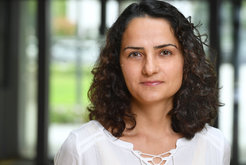Aydan Bulut-Karslıoğlu receives ERC Starting Grant
Project will investigate epigenetic mechanisms of embryonic diapause
The European Research Council has awarded a prestigious Starting Grant to Aydan Bulut-Karslıoğlu, group leader at the Max Planck Institute for Molecular Genetics (MPIMG, Berlin). The funding is endowed with a total of €1.5 million and will support her lab’s work on embryonic dormancy over the next five years.

Many animals have evolved a peculiar survival mechanism, in which they "freeze" their embryos in time when faced with challenging environmental conditions. Triggered by external cues, such as starvation, they are able to halt embryonic development until the environment becomes favorable again. During this process stem cells retain their differentiation potential, but how the embryo's memory is encoded and propagated through dormancy remains enigmatic. Aydan Bulut-Karslıoğlu has previously discovered that inhibiting one of the cell's major signaling pathways, the mTOR pathway, pushes mouse embryos and stem cells into diapause in vitro. “We use this well-controlled system to recapitulate diapause and understand how it is regulated at the genomic level,” she explains. In particular, the scientists now want to decipher the mechanism of how diapause is initiated, how it is maintained, and how cells are reactivated. To understand these processes, the team will focus on epigenetic modifications. These chemical tags on DNA and its “packaging material” are known to influence the activity of genes, without directly modifying their sequence.
Potential for the phenomenon of dormant cells
Embryonic diapause has been observed in a variety of mammals, and although it is still debated whether similar mechanisms exist in humans, Bulut-Karslıoğlu’s group recently proposed that also human cells are also capable of diapause. The overarching concept of dormancy is known to play a role in the adult human organism, where dormant stem cells serve as a pool to replenish specialized cells in tissues. Thus, the project also has the potential to pollinate research on dormancy phenomena in other contexts. “We hope that our embryonic system will serve as a vehicle for fundamental discoveries that will not only pertain to us, but also to other dormancy systems,” concludes Aydan Bulut-Karslıoğlu.
About Aydan Bulut-Karslıoğlu
Dr. Aydan Bulut-Karslıoğlu studied chemical engineering and biology at the Middle East Technical University in Ankara, Turkey. She received her Master’s degree in Molecular Biology and Genetics at Bilkent University in Ankara in 2008 and then joined Thomas Jenuwein’s lab at the Max Planck Institute of Immunobiology and Epigenetics in Freiburg, Germany for her PhD studies. In 2013, Dr. Bulut-Karslıoğlu moved to UCSF, San Francisco to perform postdoctoral work in Miguel Ramalho-Santos’s lab. In 2018, she received one of Germany’s top prizes, the Sofja Kovalevskaja Award from the Alexander von Humboldt Foundation to start her independent research lab at the Max Planck Institute for Molecular Genetics in Berlin.












